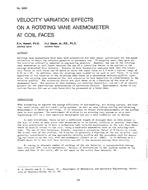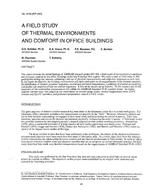Currently, simplified residential energy analysis techniques, such as the ASHRAE variable degree-day method, have often used very simplistic analysis of the heat load of the earth contact portion of residential structures. Better techniques are desireable, since performance of the building is strongly tied to the thermal load. More accurate methods, such as the shape factor method of Mitalas (Mitalas, 1983) or the Yard method(Yard, 1984), are available, although the calculations are involved enough to place them beyond the capabilities of most lay persons and to require calculation on microcomputers for others.
The method presented here is based on the correlations of Shipp (Shipp, 1983), with the temperature setting assumptions removed so that the calculation has a more general application. F-factors are developed for major residential floor types and are presented both in tabluar form as well as a series of polynomial fits. Configurations including full and shallow basements crawlspaces, and slab-on-grade floors are presented. A nnual space heating loads can be quickly determined using a hand calculator.
The results of this method are compared to annual results from the Mitalas and Yard algorithms. The methods compare to within 30% of each other — the Mitalas algorithm generally predicting the higher heat loads.
Units: I-P
Citation: Symposium, ASHRAE Transactions, 1987, vol. 93, pt. 1, New York, NY
Product Details
- Published:
- 1987
- Number of Pages:
- 7
- File Size:
- 1 file , 680 KB
- Product Code(s):
- D-NY-87-03-2


